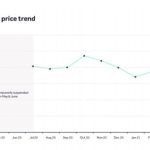The government’s scheme to turn generation rent into generation buy will not help single thirtysomethings get on the property ladder in much of England and Wales, Guardian analysis has found.
The mortgage guarantee scheme, which came into effect on Monday, will support banks and building societies to offer 95% loans, meaning that buyers only have to raise 5% themselves.
The scheme, announced in March’s budget, aims to help first-time buyers and movers struggling to raise large deposits. Even before it launched, some lenders came forward with 95% deals, and on Monday another 38 mortgages were launched.
Nationwide increases amount it will lend to first-time buyersRead more
However, analysis by the Guardian has found that single buyers in their 30s on the UK median wage will still be locked out of buying a home in about half of local authority areas in England and Wales.
Although two salaries will make it easier to raise a large mortgage, those on the UK median earnings for that age group will be unable to afford to buy a home in all of London and parts of the south and east.
The analysis looked at the cheapest types of property available in each local authority area, typically a flat or terrace house, and used median prices for those and median earnings for borrowers in their 30s. Official figures put the average age of a first-time buyer at 32.
A graphic showing where single buyers on their own will be able to afford mortgages with the new scheme
Mortgage lenders base how much they will offer buyers on their earnings and carry out affordability checks before they offer a loan.
The analysis used the Nationwide mortgage calculator to get an idea of how much could be borrowed on median earnings across England and Wales, and whether it was enough to finance 95% of a property purchase in each area.
It found that cutting the deposit needed by buyers would help in some parts of the country but in others the maximum mortgage would not be enough to secure a home.
The analysis found a single woman on the UK median female wage for 30- to 39-year-olds – £30,258 – could not afford a 95% mortgage on a median-priced property in the cheapest band in more than half of local authorities in England and Wales.
Meanwhile, a single man on the median earnings for his demographic – £34,567 – could not afford a mortgage in almost half (48%) of local authorities nationwide.
For a mixed-sex couple, both aged 32, seeking to buy their first home, a median priced flat or terrace would be out of reach in 27 of London’s 33 boroughs, as well as parts of the east and south including Cambridge, St Albans and Epsom and Ewell.
A gay couple fared a little better: they could not afford to buy in one in 10 local authorities across England and Wales.
However, this rose to one in seven local authorities for a lesbian couple, with areas such as Brighton and Hove, South Hams, and Bath and north-east Somerset out of reach.
Salaries in those parts of London where properties are most expensive are likely to be higher than elsewhere in the UK. However, a single woman among the top 20% of earners for her age group would still be priced out of London while her male equivalent is still priced out of all but one council area (Bexley). A mixed couple on a combined wage of £94,022 would not be able to afford a mortage in 13 councils in the capital.
David Hollingworth, from the mortgage broker L&C, said high house prices and rents had made it hard for people to save a deposit, and the withdrawal of 95% mortgages when the pandemic hit had exacerbated the problem.
“The deposit will hold some first-time buyers back, so the return of 95% mortgages will help accelerate the homebuying journey for some. However, it is still intertwined with mortgage affordability and the borrowing amount that the individual can support,” he said.
“In many cases it will be necessary to keep growing a bigger deposit in order to bridge the gap between the maximum mortgage borrowing and the purchase price.”
Dan Wilson Craw, the deputy director of the campaign group Generation Rent, said the 95% mortgage scheme was only likely to be used by those who were already earning enough to save up a deposit “so the impact will be that relatively few people will be able to buy a home sooner than they otherwise would”.
He added: “For people who are already paying too much in rent, and struggling to put much aside, this scheme is unlikely to help. That’s particularly the case in London where many people are handing over more than half their income to their landlord.
“Instead of gimmicky mortgage schemes, the government should focus everything on bringing down rents.”
According to the financial firm Defaqto, 38 deals have been launched, half of them two-year fixed-rate mortgages, which had disappeared entirely from the 95% market.
The cheapest two-year deal is from NatWest, with a rate of 3.9% and no fee. Santander, which launches its deals on Tuesday, will be the only one to offer a tracker mortgage under the scheme.
A spokesperson for the Ministry of Housing, Communities and Local Government said the scheme was part of a range of measures designed to help “many more people get the keys to their own home”.
The spokesperson said: “The new mortgage guarantee scheme will support more first-time buyers with smaller deposits to take their first step on to the housing ladder.”



